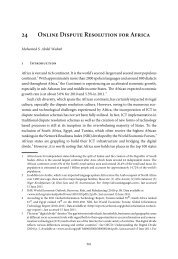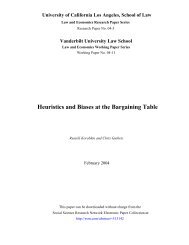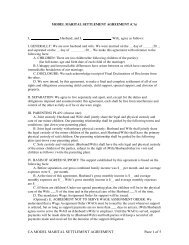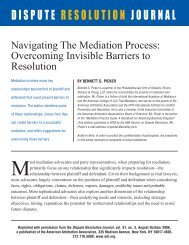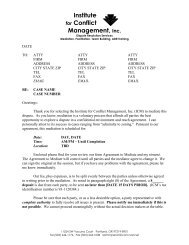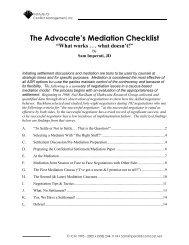17 e-Mediation - Mediate.com
17 e-Mediation - Mediate.com
17 e-Mediation - Mediate.com
You also want an ePaper? Increase the reach of your titles
YUMPU automatically turns print PDFs into web optimized ePapers that Google loves.
<strong>17</strong> e-<strong>Mediation</strong><br />
problem with asynchronous <strong>com</strong>munication is that as time passes, people forget things.<br />
Raines 74 re<strong>com</strong>mends that mediators consciously use many summary statements, to<br />
over<strong>com</strong>e the effects of time passing in asynchronous <strong>com</strong>munication. 75<br />
– Providing signposts: Mediators are both more experienced with the platform than parties,<br />
and have the advantage of being able to tailor it to their preferences. Parties are likely<br />
to be a lot less <strong>com</strong>fortable and adept. 76 Mediators need to recognize points in the<br />
process and/or areas on the platform which tend to confuse people, and provide clear<br />
instructions regarding where parties need to go, what they need to do there and when<br />
they need to do it by. 77<br />
4.3.1 Communication and Language Skills<br />
In the piece on e-negotiation mentioned above 78 many of the key <strong>com</strong>munication skills<br />
necessary to negotiate effectively online were identified. In this section, several issues that<br />
have been raised in the e-mediation literature as particularly important from the third<br />
party perspective shall be addressed.<br />
Active listening: Much of a mediator’s active listening toolbox, so important for trustand<br />
empathy- building, relies on contextual cues that are not part of text <strong>com</strong>munication.<br />
Mirroring or reflecting parties’ words back to them is another element that does not<br />
translate easily to the online environment. Hammond 79 noted that some mediators reported<br />
difficulty with mirroring. Elsewhere, 80 I have noted that reflecting is challenging primarily<br />
as it seems superfluous online: If a party’s words appear in an email trail, what good will<br />
it do to repeat them back to him or her the way we do in face-to-face mediation? And yet,<br />
active listening and reflecting serve the same purposes online as they do in face-to-face<br />
settings, and mediators cannot afford to pass up these valuable tools for showing empathy<br />
and generating trust. A good way for a mediator to demonstrate online listening is to stress,<br />
in words, that they have read the party’s message. For example, “I read your message<br />
carefully” or “Reading your letter last night, I realized…” might seem like casual opening<br />
lines, but they convey a powerful message: “you have been heard”.<br />
While demonstrating listening in e-negotiation may take some creativity, word processing<br />
can actually make reflecting relatively simple. Cutting, pasting and editing make creating<br />
a paraphrased summary of a party’s statements an easy task.<br />
Questions: When using questions to further understand a party’s position and needs,<br />
we can utilize the benefits of word processing to connect our question to specific parts of<br />
74 Summers Raines (2006).<br />
75 Id.<br />
76 See Hammond (2003).<br />
77 For other elements re<strong>com</strong>mended for the mediator’s skill-set, see Katsh and Rifkin (2001), pp. 147-162.<br />
78 Ebner (2009).<br />
79 Hammond (2003).<br />
80 Ebner (2007).<br />
391



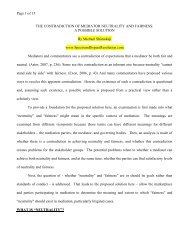

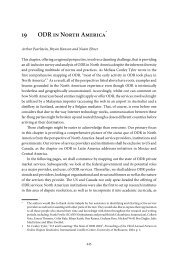
![Settlement Agreement Form [Agreement] - Mediate.com](https://img.yumpu.com/50682143/1/190x245/settlement-agreement-form-agreement-mediatecom.jpg?quality=85)

